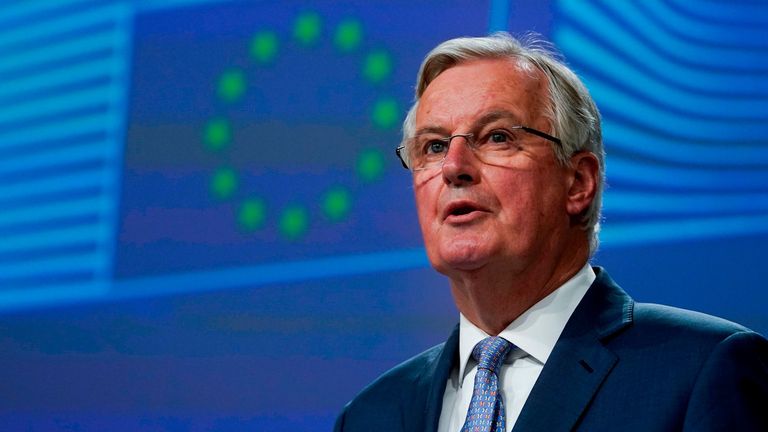Brexit talks: UK prepared to walk away in June if not enough progress made
Ahead of trade negotiations with the EU, the UK sets out its red lines, including refusing to extend the transition period.
Friday 28 February 2020 10:59, UK
The British government has said it is prepared to walk away from EU trade talks in June if not enough progress has been made.
Setting out its red lines ahead of talks with the EU starting next week, the government said it will not negotiate any arrangement in which the UK does not have control of its own laws and political life.
In a document published on Thursday morning, it said: "That means we will not agree to any obligations for our laws to be aligned with the EU's, or the EU's institutions, including the European Courts of Justice (ECJ) to have any jurisdiction in the UK."
It insisted there was plenty of time to negotiate an agreement with the EU by June, to have it finalised by September and to then leave by the end of the transition period on 31 December.
The UK's red lines for EU negotiations:
- The UK is prepared to walk away from talks in June unless a "broad outline" is drawn up
- Westminster will not agree to anything in which the UK does not have control of its laws
- If not enough progress is made, the UK will rely on World Trade Organisation terms similar to Australia's relationship with the EU
- The transition period will not be extended beyond 31 December so the UK will leave the EU's single market and customs union by 1 January, 2021
- Access to British fishing waters will not be linked to access to EU markets, as demanded by Brussels
The government's position puts the UK on a collision course with Brussels, which demands a "level playing field" as a condition for a trade deal.
The bloc's chief Brexit negotiator, Michel Barnier, tweeted: "We take note of the UK's mandate published today and will discuss our respective positions on Monday.
"We will stick to all our prior commitments in the political declaration.
"We want an ambitious and fair partnership with the UK in the future."
:: Listen to All Out Politics on , , ,
Speaking in the Commons as the document was published, Cabinet Office minister Michael Gove said the UK will seek "to emulate and build on the types of relationship that the EU already has with other independent sovereign states".
He added that by using already existing precedents, the UK "should be able to expedite agreement".
Fishing rights have already become one of the major points of contention ahead of the talks, with Brussels demanding the UK continues to allow EU fishing fleets access to British water, threatening that there "won't be any agreement at all" if that does not happen.
Mr Gove said: "We will determine other countries' access to our territory on our terms."
Addressing one of the major issues of a trade agreement, Mr Gove said the negotiations will be undertaken with "full respect" to the Northern Ireland protocol which aims to avoid the introduction of a hard border on the island of Ireland.
He said there will be no border in the Irish Sea.
Boris Johnson said he will not be making any concessions in the negotiations.
The prime minister said: "We're not going to engage in some race to the bottom.
"All we want is mutual recognition of each other's high standards, and access to each other's markets.
"We wouldn't ask the EU to follow every change in UK legislation, so it doesn't make any sense for them to make the same requirement of us, and that's where we are."
Asked if he accepts the UK will have to make concessions in the negotiations, Mr Johnson said: "Er, no."
Northern Ireland First Minister Arlene Foster, whose party's crucial support the government relied on until it won a majority in the last election, warned against the "unsatisfactory and potentially devastating" consequences if there was no-deal.
"For businesses in Northern Ireland reliant on unfettered access to Great Britain, in both directions, this would be retrograde step," she said.
"We are in no doubt that the provisions of the Northern Ireland Protocol would add significant cost, delay and disruption.
"It is therefore imperative that the Government continues to invest time and resources into offsetting risks to businesses in parallel with talks on the future relationship."






